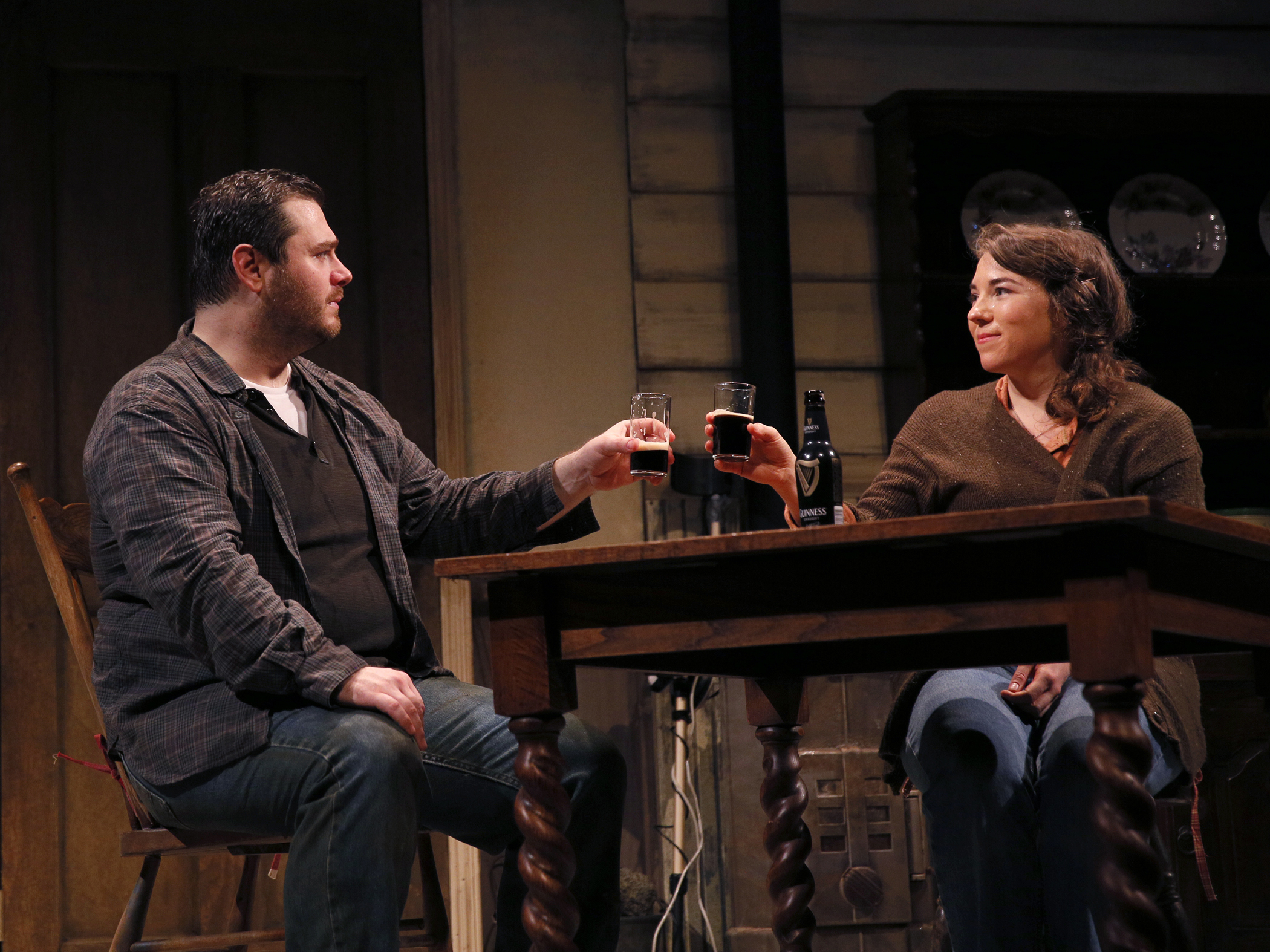The pathos of mental decline has been mined productively in theater for many centuries. First it was blamed on the gods, then on social context—“the mother,” etc. At last, in the era of brainscans and nanovision, we get down to deeply personal and impersonal biophysics, with explanation-seeking drama yielding to stories of adjustment and acceptance. Sharr White’s Tony-nominated 2011 play, The Other Place, about a type-A scientist relinquishing her edge, milks the pathos of losing one’s mental grip while avoiding bathos, its clumsy twin. If your resources permit, skip this review and go see SPT’s affecting production with minimal foreknowledge. The elements are meant to reveal themselves in a particular order, and it’s best if you don’t know who’s who and what’s what. That said, with all the entertainment options out there, a teaser and commentary on the production may be in order.
Clouds surround the stage, projected onto screens that also serve as planes for medical slides and video. But at the beginning the screens simply reflect clouds. Not fluffy white clouds against blue sky, but murky, nebulous gray-on-gray ones that don’t start or end anywhere, but simply fill the screens with menacing confusion. Then suddenly we’re watching Juliana Smithton, a mouthy neurologist-turned-businesswoman, on a brightly lit dais, relating the bizarre tale of “an episode” she had while presenting research findings for her new breakthrough drug at a conference in the Virgin Islands. Amy Thone scathes in the mordant role, her Giacometti-thin frame clad in the Armani-esque armor of international pharmaceutical sales.
Fear not: Juliana’s lecture format is nothing to dread. Indeed, it’s an entertaining means of meting out exposition, character traits (including her self-deprecating humor), and even elements of mystery, like her obsessive loathing of a female conference member who listens to the presentation wearing a yellow bikini. Interspersed within the lecture are vignettes from Juliana’s imagination, including cameos from her oncologist husband Ian (Ray Gonzales), daughter (Jocelyn Maher, who also plays two other roles), and post-doc (John Bianchi). Juliana’s ragged mind seems particularly adept at recalling the frictions it has experienced with each of these. Yet director Kelly Kitchens extracts the most poignancy from Juliana’s regrets, her attempts at civility and reconciliations, and her mistaken identities. As in Margaret Edson’s 1999 Pulitzer winner Wit, the main conceit here is a great and prideful intellect humbled by mortality. But in contrast to most theater about mental illness, which capitalizes on the dramatic irony of the audience knowing more than the sick person, The Other Place’s exchanges deliberately whip by at an audience-confusing pace. Aptly, they jump around like slides in Juliana’s PowerPoint presentation about her protein-folding drug. In taking Juliana’s POV, many scenes produce the kind of disorientation an Alzheimers- affected person might feel.
Scenic designer Tommer Petterson solves the age-long challenge of SPT’s low-rise seating by lifting the action onto risers and barstools where we can see it. The simple, abstract sets get more specific and detailed as Juliana’s mind degenerates. All synaptic pathways lead her back to a beach house (the eponymous “other place”), depicted by Petterson as a ramshackle-chic composite of shutters, fences, and stainless steel. There, Andre Nelson’s rainy audio agitates, as though the clouds from earlier had unleashed themselves like Furies. A moving case of mistaken identity unfolds there, revealing several family secrets. In this Lear-like scene of reckoning, Thone transforms her body from imperious clothes-horse to tortured, starving child. Even though I sat behind her and missed all the drama of her face, I got the gist by watching her emaciated torso nearly slip out of the belt meant to moor it.
Capturing the experience of mental illness with generosity and nuance onstage is a tricky matter. To their credit, playwright, director, and actor allow naturally occurring humor, including terribly bitter humor, to stand on its own terms. Juliana seems as baffled and troubled as anyone else—not by any one joke, but at her own mean tendencies. Why was she so savagely preoccupied with the conference attendee in the yellow bikini? Watching Thone puzzling it out in those moments of self-reflection is like watching Oedipus try to untangle his contradictions.
From A Streetcar Named Desire to Who’s Afraid of Virginia Woolf to Hamlet’s Ophelia, we are saturated with the trope of women driven to madness by the world they live in. As neurological understanding of Alzheimers grows, inevitably the phenomenon of faulty physiology will at least partially displace that of misogynistic social circumstances as a contributing factor to women’s mental illness in theater. Hallelujah. One bright spot in the cloudy forecast of The Other Place is the kindness of others, including strangers, that Streetcar’s Blanche Dubois hoped existed in the world. Here, Juliana’s paranoid demons are met with compassion. Though it may not be counted on to heal neurophysical anomalies, here it makes them more bearable. E
stage@seattleweekly.com








